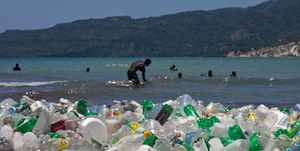Humans need manganese, although this was only realized in the 1950s, perhaps because the requirement is so modest. (1) Some of the health benefits of manganese include helping promote healthy bone structure, bone metabolism, and creating essential enzymes for building bones. It also acts as a co-enzyme to assist metabolic activity in the human body. Apart from these, there are other health benefits including the formation of connective tissues, absorption of calcium, proper functioning of the thyroid gland, and sex hormones, regulation of blood sugar level, and metabolism of fats and carbohydrates. (2)
- Tuesday, April 29, 2014


 Media exaggerated the patch size by a factor of more than 200
Media exaggerated the patch size by a factor of more than 200
 When it comes to bird kills, oil, gas and electric utility companies face heavy fines. Wind farms get a free pass
When it comes to bird kills, oil, gas and electric utility companies face heavy fines. Wind farms get a free pass
